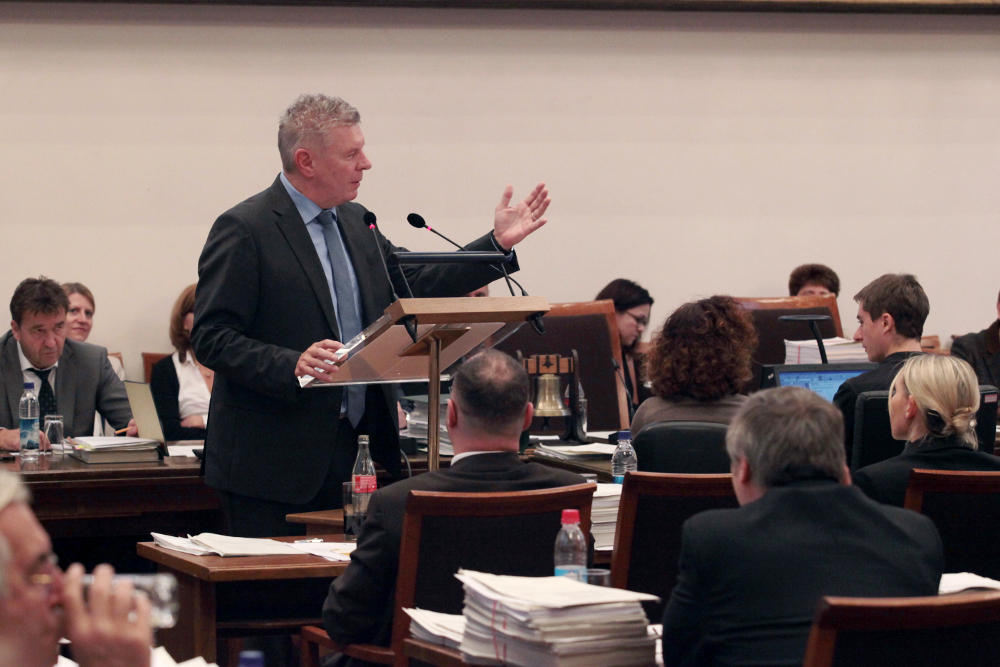 © Michael Nagy
© Michael Nagy
Interview with Mr Dieter Reiter, Mayor of Munich
We are pleased to present you the full version of the interview of the Bulletin 21 with the Mayor of Munich, Mr. Dieter Reiter.
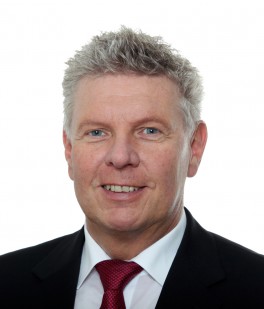
Munich is…
… a sustainable city in balance which offers a healthy and family-friendly living environment. It is an economically flourishing city that creates jobs and secures them.
Munich is a beautiful city with a rich cultural life and a great feeling for solidarity which ensures social peace, creates educational opportunities and involves all of its citizens, a cosmopolitan city of vitality and tolerance. Munich’s efforts are directed towards the common welfare. Hence, it influences political and social developments and encourages the commitment of its citizens.
What are the main challenges for the city?
Following Munich`s attractiveness more than 300.000 people are expected to move to the Munich region during the next 15 years. Due to the city’s rapid growth and the relatively high number of young refugees who come to Munich, the demand for more pedagogical institutions is quite high at the moment. Therefore Munich will have to provide more kindergarten places and school buildings with high quality and best-trained staff to meet the needs of an inclusive educational approach as fast as possible.
The leitmotif of the Munich City Development Strategy during the 1990 decade was “compact, urban, green”. However, on-going population growth will make expansion into neighbouring areas necessary.
A lot of the city’s measures and programs in place or planned so far centre on substitution and efficiency improvement. As boundless availability of resources cannot be taken for granted, we will have to rethink and start from the idea of sufficiency in the future. To combine sufficiency, efficiency and substitution strategies will necessitate institutional changes and the establishment of respective management systems.
A “selective green growth” strategy has to be balanced with selective degrowth. Right now it works mostly additive.
Munich’s transition to a more sustainable development rests on acceptance of its citizens and therefore on just distribution of income and wealth. To seek broad consensus a continuous institutionalized dialogue, like some long-term oriented consultative body, a future council or ombuds-system, seems adequate. Indicator based reporting can provide a rational foundation for the dialogue, while the reporting should be carried out by the consultative body.
Munich is a city with a high quality of life. What aspects would you highlight as guarantors of this quality? How do you promote the fact that this welfare reaches all the inhabitants?
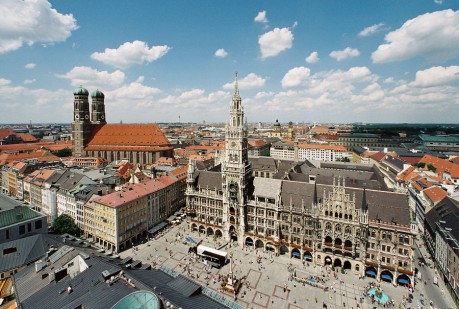 Munich’s policy is aimed at social cohesion and intercultural inclusion. It provides the citizens with very well functioning social and technical urban infrastructures. It spends a lot of money on its social and welfare policies. Alongside statutory welfare support, the city also finances a wide range of extra, voluntary services. With funds from charitable trusts and donations from citizens and businesses, the numbers of individuals and families in real need are not as numerous as in other cities, but the aim should always be, to not have any at all. Around 180 charitable trusts and foundations help to ensure social harmony in the city.
Munich’s policy is aimed at social cohesion and intercultural inclusion. It provides the citizens with very well functioning social and technical urban infrastructures. It spends a lot of money on its social and welfare policies. Alongside statutory welfare support, the city also finances a wide range of extra, voluntary services. With funds from charitable trusts and donations from citizens and businesses, the numbers of individuals and families in real need are not as numerous as in other cities, but the aim should always be, to not have any at all. Around 180 charitable trusts and foundations help to ensure social harmony in the city.
To act with solidarity means acting together. With partners such as public welfare bodies, religious communities and together with the city’s citizens, Munich is fighting against poverty and social inequality, and has created, a dense network of facilities and services to do so.
Munich has made a commitment towards sustainable development. Can you explain some of the most relevant measures you are carrying out?
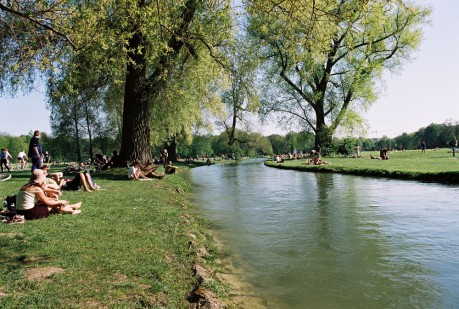 More than one decade ago the Munich City Council adopted 9 “sustainability goals”, based on the Local Agenda 21 process of the nineties. The City Council also ordered the city administration to prepare a report on the state of sustainable development in Munich every third year. In 2010 the sustainability goals were merged into the City Council’s guidelines for urban development, the so-called “Munich Perspective”.
More than one decade ago the Munich City Council adopted 9 “sustainability goals”, based on the Local Agenda 21 process of the nineties. The City Council also ordered the city administration to prepare a report on the state of sustainable development in Munich every third year. In 2010 the sustainability goals were merged into the City Council’s guidelines for urban development, the so-called “Munich Perspective”.
The latest sustainability report of 2013 emphasizes “strong” sustainability and describes sustainable development as a process to procure a decent life for all within Earth’s ecological boundaries and capacities. For the first time on city level in Germany, it introduces the ecological footprint and the index on regional welfare as indicators. Munich’s strategy towards sustainable development centres around efficiency and substitution.
The City of Munich controls virtually all of public infrastructure utilities by communally owned enterprises, like the Stadtwerke Munich (SWM), which are responsible for electricity, gas, heating, water supply and sanitation and parts of the telecommunication grid, and which run most of local public transport (bus, tramways, metro).
One goal is to produce enough “green” electricity by 2025 to arithmetically meet the requirements of the entire city. By 2040, Munich is to be the first large German city with district heating solely originating from renewable energy sources. To realize this vision, the SWM will be concentrating on further tapping of geothermal energy.
The renewable energy strategy of Munich in fact is a growth strategy, too, albeit towards sound technologies: At least for the next 10 years, it adds to the SWM fossil energy power plant park and the nuclear power plant (ISAR 2) where the SWM are still engaged. Because the SWM solar and wind power plants are located in Spain, offshore (North sea) and onshore (northern parts of Germany), the SWM claims to add more and more renewable power to the great “European energy lake”.
Started in 1989, the Munich Energy Saving Program today spends 14 million Euros per year to retrofit private and public owned houses above compulsory standards. The municipal consulting agency -the Bauzentrum- gives technical advice to investors and the construction sector on energy saving and renewables. Since 1998, the Eco Profit Program provides a forum for exchange and consultancy on efficient use of resources for small and medium enterprises.
The city owned Munich Association for Urban Reconstruction develops, plans, builds and runs settlement schemes while another enterprise runs 37.000 flats in order to keep rents affordable.
The Munich Bio-City Program, an initiative for healthy and regionally produced food at schools, university cafeterias, in kindergartens and canteens, aims for more balanced diet habits (reducing meat); it is one of the few measures addressing sufficiency. Numerous municipal programs for education, jobs, integration and gender mainstreaming back up social coherence and fair access, and counter impoverishment and exclusion.
The City of Munich is member of the UN accredited Centre of Expertise for Education on Sustainable Development (ESD). The Munich network aims at institutionalizing ESD in the education system.
Public transport systems in Munich are continually improved, car & bike sharing is introduced and electric vehicle pilot programs are on the way.
Within this framework, one of the measures applied is the restriction of access to the centre of the city of vehicles with high emissions of CO2. What level of acceptance has this measure had amongst the citizenship?
Since October 2012 only vehicles with a green sticker are allowed into the inner circle of the city. This is mandatory for all cars, buses, trailers and lorries. The fine is 80 Euros if vehicles enter the city without the green sticker. The acceptance is quite high by now. First measures have already been implemented in 2008. In order to reduce high emissions of CO2 it is a measure that has been implemented in many of the big German cities. Different colours of stickers – red, yellow and green – show the emission index of the different motors of the vehicles and allow access to the city accordingly.
Are these initiatives accompanied by citizen awareness-building actions? Could you give some examples?
The German Government produced flyers and subsidizes the build in of filters with 330 Euros for each applicant in order to reduce emissions.
Munich has set in motion different initiatives for enabling access to the labour market. Could you explain some initiatives aimed at the labour insertion of youths?
First and foremost we have a tried and tested system of vocational education and training, which plays a decisive role in supporting young people in gaining access to the labour market. In addition to apprenticing companies, more than 80 vocational schools, which are funded and operated by the City of Munich, make an important contribution in this respect. In this context, we do not merely implement initiatives or projects but pursue a long-term structural approach, which has proven very efficient especially in times of economic crises, such as in 2008/2009. Munich’s system of vocational education and training is a strong pillar of one of the lowest youth unemployment rates in Europe.
Continuous improvement in this area is also a main aspect, with counselling and support being the more recent focus. The Youth Professional Training programme – Jugend in Bildung und Beruf (JIBB), a program strongly backed by all those involved, focuses on offering counselling and support at central locations in order to smooth the way into employment for young people. The program also strives to improve weak points in our system, e.g. by providing even better support to young people from a migrant background who leave Mittelschule (general, vocationally oriented secondary school for nonuniversity bound pupils). The Department of Education and Sports has established a career planning centre (b-wege Stelle, Berufswegplanungsstelle) which does exactly that.
Could you also state which ones are aimed at the insertion of the long-term unemployed?
The City of Munich is pursuing a multi-program approach with respect to the long-term unemployed. One main emphasis is on providing employment and qualification opportunities in order to re-integrate people into the labour market. The City of Munich spends approximately 30 million € every year on pertinent programs – more than any other city in Germany. At present, we are funding more than 110 projects and programs, thus improving opportunities for those who are in a disadvantaged situation on the Munich labour market.
The City of Munich is planning to establish a “third”, municipal labour market benefiting those who are unable to find jobs in the “first” labour market themselves. These long-term unemployed will be able to get employment, thus improving occupational prospects and ensuring participation in the City’s social life.
Could you explain the aim of the AMIGA project and what it consists of?
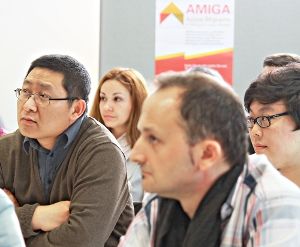 AMIGA stands for “Active MIGrAnts in the Local Labour Market” and is a European cooperation project organized by the Department of Labour and Economic Development and the Centre for Migration Studies at the Adam Mickiewicz University in Poznan, Poland. It is an active approach to the labour market. In pursuit of this goal, the AMIGA project helps qualified migrants to enter the Munich labour market and find employment in keeping with their qualifications. Munich needs well-educated and well-trained labour – and qualified migrants in Munich need good jobs.
AMIGA stands for “Active MIGrAnts in the Local Labour Market” and is a European cooperation project organized by the Department of Labour and Economic Development and the Centre for Migration Studies at the Adam Mickiewicz University in Poznan, Poland. It is an active approach to the labour market. In pursuit of this goal, the AMIGA project helps qualified migrants to enter the Munich labour market and find employment in keeping with their qualifications. Munich needs well-educated and well-trained labour – and qualified migrants in Munich need good jobs.
AMIGA puts the potential afforded by qualified migrants to good use for the Munich labour market, promotes dialogue between employers and the target group, and develops strategies for the latter’s successful integration in the labour market.
To make it easier for qualified migrants to enter (or re-enter) the labour market, AMIGA has put together a package of offerings for its target group: the MigMENT mentoring program, seminars on topics relating to the labour market, and job fairs. In addition, AMIGA provides information about other relevant events and services made available in Munich.
AMIGA targets qualified migrants who are seeking employment, international students and graduates of Munich’s universities, and migrants who are keen to take up self-employment.
Three panels of experts provide advice to the project and formulate strategies to help the target groups play an active part in the labour market. The collaboration with the AMIGA cooperation partners seeks to establish ever more closely linked networks and encourage fruitful dialogue on the following topics: Bundling and publicizing existing activities for the three project target groups in Munich; evaluating the success of existing offerings; and developing strategies and recommendations for action to help integrate the target groups in the labour market.
Three specially trained experts with a migration background work for AMIGA as “scouts”. They serve as the mouthpiece for and intermediary between institutions and the target groups. Part of their job is to reach and forge links between the target groups, give them access to the information they need, and cultivate lasting relationships with migrant communities. At the same time, they are working together with the Chair of Education and Empirical Educational Research at Ludwig Maximilians University Munich to analyze the needs of qualified migrants on the Munich labour market.
In the context of this project, European cooperation seeks to identify common features of and differences between the migration situation in the “traditional” EU member states and in those states that have joined more recently, and to promote the sharing of knowledge and experience. Cooperation focuses primarily on labour market integration and the development of a pool of potential labour for the local economy. Both topics are being addressed by experts from Munich and Poznan.
The project partners’ findings were evaluated from the point of view of transferability and presented in an international conference which concluded the AMIGA project in Munich in May 2015.
Munich is a cosmopolitan city, could you explain some initiatives that promote the harmonious coexistence between different cultures? Which is the role that education plays in building a more cohesive city?
Munich is synonymous with diversity, meaning that for children and young people in Munich it has long been a self-evident fact that they are part of a very diverse society where people come from different migration backgrounds, have different life stories, speak different languages and belong to different religious communities. From a statistics point of view, more than fifty per cent of children and young people in Munich have a so-called migration background. We realized long ago that pedagogical approaches need to start as early as possible and that educational institutions at all levels play a significant role. This is the reason why more and more day care centres and schools very deliberately embrace language-related and cultural diversity and no longer consider this to be a problem but an opportunity for all those involved.
The City of Munich’s Pedagogical Institute devotes special attention to the subject of “Interculturality – Diversity – Anti-discrimination” and supports educational institutions in embracing diversity even better. This includes counteracting any type of discrimination, especially racism, on an individual and structural level. In addition to offering special training courses, schools receive specific advice and conceptual support when planning pertinent school projects or events for entire classes or groups of students.
In this context, the “School of Diversity” teacher training course deserves special mention. It comprises several theoretical modules, for example topics such as anti-bias training, intercultural communication, everyday racism, and also includes some practical modules with an emphasis on multilingualism, parent participation, networking and school development. A main focus is on self-reflexion: Participants reflect on the “images in their head” and the resulting opinions and attitudes. The training course also addresses related topics, such as gender pedagogy, global learning and media. The 17-day course ends with a project outline for implementation in schools – as a starting point for a comprehensive school development process.
The Pedagogical Institute is also a regional coordination centre for a student project titled “School without Racism – School with Courage”, a network of schools who take action against discrimination, racism and violence. The Institute organizes conferences and training courses for all regional schools involved in the network and supports these schools in the implementation of pertinent projects. Celebrities also provide support and act as mentors to the schools. The title “School without Racism” is not awarded for past achievements, but instead is considered a self-commitment geared towards the present and the future. Every school that bears this title is part of a network which is committed to accepting responsibility for the school climate and the social environment.
What is the added value of belonging to the International Association of Educating Cities for Munich?
Munich is a city which is proud of its diversity and its commitment towards education. In this regard Munich strongly promotes equal opportunities in education for all its citizens and values such as respect, tolerance and participation.
One advantage of belonging to a network like the IAEC is that we are able to collaborate with partners all over the world for instance through exchanging experiences and best practices on certain challenges that we share. Another very important benefit for Munich is that the integrated and comprehensive understanding of education, like it is also formulated in the Charter, offers new opportunities for cooperation not only on an international level but also on the local level. Thus, the fact of being a member of the IAEC plays a crucial role in making Munich a city in the heart of Europe where it is worth living.
Which issues or topics would you like to work on with other cities of the International Association of Educating Cities?
Munich is a prosperous city in one of the strongest economic regions in Germany, which offers numerous opportunities to experience art and culture, in addition to a wide range of opportunities for education and sports. However, the attractiveness of Munich also promotes its rapid growth, which currently is being more and more increased by the arrival of many refugees. Therefore, it is interesting for Munich, in cooperation with other cities in the IAEC, to learn from each other how the existing opportunities can best be used and, where appropriate, be further developed in a way that newly arrived Munich citizens can fully develop their comprehensive potentials and thus quickly find a new home. Another challenge which Munich currently faces is related to the living conditions in the city.
On the one hand housing space, which is affordable for people living in Munich, is increasingly difficult to provide. On the other hand, an increase of individual traffic requires innovative and sustainable mobility concepts that will continue to meet the needs of a diverse urban community such as Munich. In this context, the exchange with cities in the IAEC is certainly desirable.
As Mayor of Munich, could you share with us a dream or a wish?
I am proud of Munich’s active and committed citizens and its diversity, which I want to guarantee and promote.
Photos:
Presseamt München
Michael Nagy
Dieter Reichler
Por categoria
- Assembleia (27)
- Banco de experiências (32)
- Comissão de Coordenação (2)
- Comité (15)
- Congressos (75)
- Dia Internacional (64)
- Encontro (3)
- Experiência destacada (16)
- Exposição (17)
- Formação (18)
- Out of Category (64)
- Prémio (26)
- Publicações (107)
- Redes (155)
- Videos (6)
